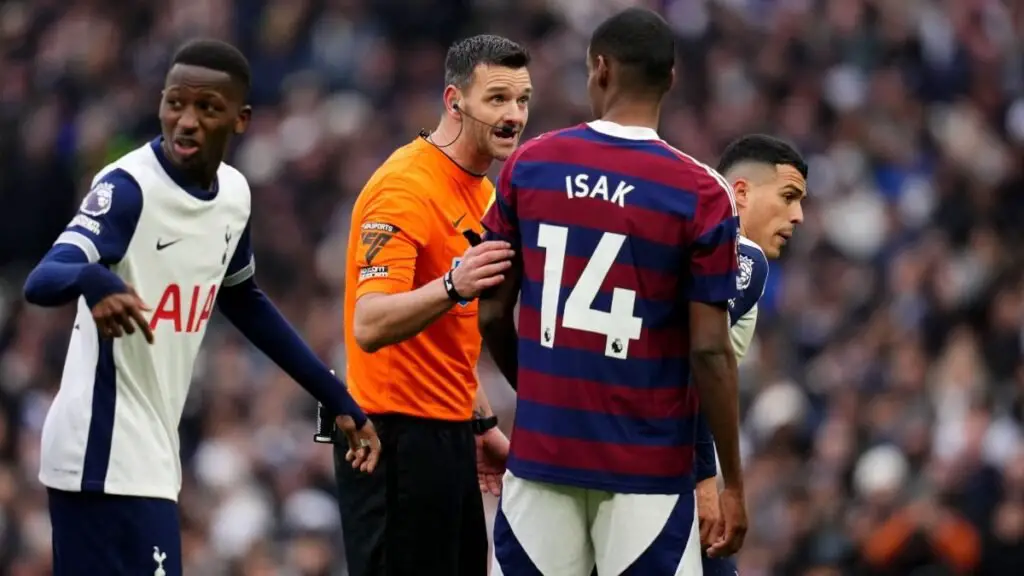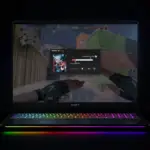This weekend’s Premier League play was full of drama, with controversial refereeing decisions taking center stage in several games.
Many fans were left with sour faces and confusion after seeing the goals stand despite their protests, and there were a few controversial penalty calls up for debate.
By the end of Sunday, thousands of viewers were left baffled by some of the Premier League’s laws, so we’ve provided explanations for four of the weekend’s most high-profile incidents.
Why Newcastle’s first goal against Tottenham was allowed
Newcastle’s opening goal in a 2-1 win over Tottenham sparked controversy as replays appeared to show Joelinton controlling the ball in the build-up.
As midfielder Lucas Bergvall tried to shoot the ball past the Brazil international, the ball hit his hand and then fell to Bruno Guimaraes, who brought on Anthony Gordon to equalize.
The goal was allowed to stand after a VAR review.
#TOTNEW – 7′
The referee’s goal call was confirmed by VAR, which checked in advance for a possible handball by Joelinton and concluded that his arm was in a natural position at his side and the contact was accidental.
— Premier League Match Center (@PLMatchCentre) January 4, 2025
The reason lies in the Premier League handball rules, which differentiate between accidental and intentional handball.
In order for a goal to be disallowed in the build-up game, the player must either score directly or prepare a goal immediately.
In this case, Joelinton’s handball was deemed accidental and occurred earlier in the game, meaning it did not meet the criteria for intervention.
Spurs fans were frustrated and argued that the incident affected the fairness of the game as without his hand stopping the ball they would have got past Newcastle’s press and gone on the attack.
Why wasn’t Gordon awarded a penalty?
Later in the same game, Newcastle were denied a penalty when Anthony Gordon went down in the penalty area following a foul by Dejan Kulusevski.
Replays showed Kulusevski leaning his shoulder into Gordon, who made contact with the winger’s face, leaving him with a bloody gash.
Referee Andy Madley allowed play to continue and the VAR did not intervene, infuriating Newcastle fans. #
The referees ruled that Kulusevski’s contact was accidental and not reckless or excessive, which is required for a foul in such situations.
The decision emphasized the subjective nature of such calls, as many argued that Gordon’s momentum was clearly affected by the challenge.
Why Liverpool received a penalty against Manchester United
#LIVMUN – 67′ WAS OVERCOME
The VAR recommended an on-field check for a possible handball by de Ligt as it concluded his arm was raised in an unnatural position. After review, the referee reversed his original decision not to award a penalty.
— Premier League Match Center (@PLMatchCentre) January 5, 2025
Liverpool’s 2-2 draw with Manchester United included a controversial penalty for a handball by Matthijs de Ligt.
When Mohamed Salah attempted a cross, the ball hit De Ligt’s outstretched arm and referee Michael Oliver pointed to the spot after a quick VAR check.
The basis for the decision was the updated handball laws, which contain regulations on unnatural arm positions.
It was believed that De Ligt’s arm was in an unnatural position, causing his body to become unnaturally larger and blocking the ball’s trajectory.
Critics argued that De Ligt had little time to react, but under the rules of the game, intent was no longer a necessary factor in handball decisions.
Salah converted the penalty, which added to the United fans’ frustration, especially because they were playing so well.
Why Brighton received a penalty against Arsenal
#BHAARS – 58′
The penalty awarded by the referee for a foul by Saliba on João Pedro was reviewed and confirmed by the VAR, which concluded that there was sufficient contact for a penalty.
— Premier League Match Center (@PLMatchCentre) January 4, 2025
Another controversial penalty was awarded in Brighton’s clash with Arsenal when William Saliba was convicted of headbutting Joao Pedro in the penalty area.
The incident occurred during a challenge for a loose ball, with Saliba’s forehead touching Pedro’s head.
Referee Anthony Taylor awarded the penalty and after review, the incident was confirmed by VAR.
The key factor was Saliba’s movement towards Pedro, which was interpreted as dangerous and reckless, even though contact appeared minimal.
Critics of the decision argued that Pedro’s reaction exaggerated the effect, but under current rules it is considered a foul, particularly because Saliba did not win the ball.





